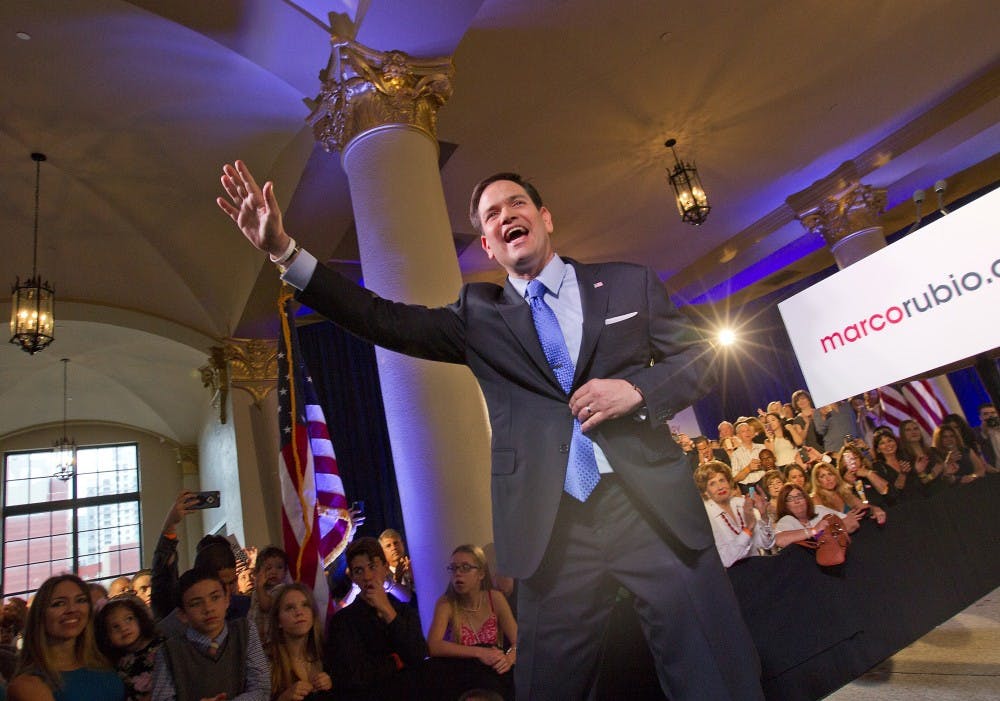Ben Turner: Yes
In the Republican Party’s "autopsy" of why they lost the 2012 presidential election, they noted a need for the party to reach out to minorities and younger voters, two groups they had limited support from.
Little did they know, they would have not one but two young Hispanic candidates competing for their party’s nomination in 2016.
Ted Cruz and Marco Rubio are not only the same age and Hispanic — their entire biographies are remarkably similar. Both Cruz and Rubio claim Cuban ancestry, both have law degrees and both served in state politics before running for and winning U.S. Senate seats.
However, for major party nominations for president, just like in "Highlander," there can be only one. And it’s not going to be Cruz, who has made too many enemies with scorched earth politics. Rubio represents not just the cream of the senatorial crop, but maybe of the entire field. There have even been whispered comparisons to the Republican version of He-Who-Must-Not-Be-Named, Barack Obama.
Rubio, save for the occasional red-meat-tossing speech and Tea Party flirtations, is what can be called a successfully moderate Republican in today’s political climate.
In the Senate, he worked with Democrats on immigration reform, student loan debt and small business loans.
On the campaign trail, he has positioned himself well as a viable general election candidate, especially to primary voters in South Carolina.
And he won heaps of praise for looking presidential in the first Republican debate while others (read: Donald Trump) were busy looking foolish.
Rubio, just like any politician, is not perfect. He has a checkered financial history, allegedly charging a back wax to the Florida GOP and buying a speedboat while in deep debt. He has been playing hooky from important Senate votes. He became a meme for not knowing how to take a water break during his State of the Union response. Perhaps most seriously, he has flip-flopped on abortion rights and illegal immigration.
But all of these are ultimately trivial complaints compared to some other major contenders in the Republican Party. He might be right that he is the best chance the GOP has against Hillary Clinton in a general election.
The trouble for Rubio will be standing out in the wackiest presidential election this country has seen since recounting votes in his home state gave George Bush the keys to the White House. The person who wins the GOP nomination will be the one who can find the middle ground between the increasingly raucous and rowdy right wing and the upper crust, country club, chamber of commerce voters who bankroll and run the party.
Rubio might be the man for that job.
Griffin Hobson: No
Marco Rubio once looked very formidable. He was selected to give a State of the Union rebuttal, vetted as a potential 2012 vice-presidential candidate and dominated very early polling. Nothing the left, or conservative rivals, found on him seemed to stick. Dubbed the crown prince of the Tea Party, many expected Rubio to rocket toward the top of the field and never look back.
That has not happened. It has been years since Rubio topped the polls and he has been as low as 4 percent in recent months. Now he is hovering in the high single digits, landing him in fourth place. He has exactly one member of Congress endorsing him, and no governors or other senators. While he has a fair amount of money at his disposal — roughly $43 million split between his campaign, super PAC and nonprofit at last check — he is still only in third place in the fundraising race, potentially lower if Donald Trump taps into his billions.
Rubio maintains some advantages. He has high favorability ratings, he does very well in the prediction markets and he is often spoken of as a leading candidate in a crowded field. Furthermore, he is known for his speaking skills, which helped give him a fairly strong debate performance. Attacks on him have not stuck well, and he is often viewed as a fairly non-divisive, forward-looking candidate who can help the GOP win again.
In a normal election, I would say this would put him in a strong place. This is not a normal election.
Jeb Bush snatched away almost all of Rubio’s potential home-state endorsements and donors, as well as denying Rubio the chance to win an early, delegate-rich primary. And a well-liked but seldom-loved candidate like Rubio would ordinarily be best off winning through a slow accumulation of support as other candidates dropped out.
But this year, with lots of money in the field and a plethora of candidates, it could take a long time for the field to get down to the last few candidates. Furthermore, there are many candidates that are ideologically similar to each other. Rubio will have to wait for not only other candidates to collapse, but on other candidates waiting on other candidates to collapse. His campaign cannot survive on single digit support long enough to win.
A lot of the appealing things about Rubio as a general-election candidate also ring hollow. While he is young and Hispanic, many of the policies he advocates for are unpopular with the demographics he would be trying to gain support from. Plus, the national media has yet to seriously examine his political scandals in Florida, of which there are a few fairly serious ones.

